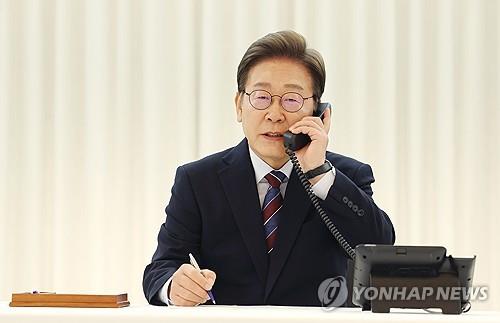- California Assembly OKs highest minimum wage in nation
- S. Korea unveils first graphic cigarette warnings
- US joins with South Korea, Japan in bid to deter North Korea
- LPGA golfer Chun In-gee finally back in action
- S. Korea won’t be top seed in final World Cup qualification round
- US men’s soccer misses 2nd straight Olympics
- US back on track in qualifying with 4-0 win over Guatemala
- High-intensity workout injuries spawn cottage industry
- CDC expands range of Zika mosquitoes into parts of Northeast
- Who knew? ‘The Walking Dead’ is helping families connect
S. Korea, U.S. expected to speed up tariff talks after 1st Lee-Trump call
South Korea and the United States are expected to accelerate working-level tariff negotiations after President Lee Jae-myung and U.S. President Donald Trump agreed to swiftly reach a mutually satisfactory agreement during their first phone conversation since Lee took office.
In the 20-minute phone conversation late Friday, the two leaders discussed the tariff issue, encouraging negotiators to deliver tangible outcomes ahead of the July 8 expiration of a U.S. waiver on reciprocal tariffs for South Korea and other key trading partners.
Lee’s first phone talks with Trump came two days after his taking office, capping months of political and diplomatic uncertainty after former President Yoon Suk Yeol was ousted in April over his failed martial law bid.
Experts noted that while the Trump administration has actively pursued early agreements with major trade partners, talks with South Korea had stalled due to a lack of political leadership during Seoul’s leadership transition period.
Scott Bessent, U.S. treasury secretary and chief negotiator on tariffs, said last month that Seoul brought “very good proposals” to the table even during its government transition period before the election cycle kicked off.
With the waiver deadline just a month away and both leaders stressing the need for a swift deal, the third round of negotiations is likely to take place this month.
The two sides had previously agreed to aim for a comprehensive “July package” before the July 8 deadline.
During the second round, the South Korean delegation, including officials from the trade, finance, foreign affairs and agriculture ministries, exchanged detailed views with their U.S. counterparts.
Washington reportedly raised concerns over non-tariff barriers, including regulations affecting beef and other agricultural goods, which have been listed in its National Trade Estimate report. As a result, South Korea is expected to present more specific responses in the third round based on a thorough interagency review.

“The second round was meaningful in that we identified the specific areas of interest for the U.S. side, while they gained a better understanding of our position. We will coordinate with relevant ministries to address their demands in the upcoming round,” a senior South Korean trade official said last month.
For South Korea, which heavily relies on exports, the challenge is to reduce the 25 percent reciprocal tariffs imposed by the Trump administration while defending its positions in individual sectors under U.S. scrutiny.
Seoul is also seeking the elimination or reduction of item-specific tariffs the U.S. has levied on products, such as automobiles, steel and aluminum.
“We are closely reviewing the U.S. demands in coordination with all relevant ministries, and the third round of talks will be guided by President Lee’s negotiation framework,” a senior Seoul official said.












